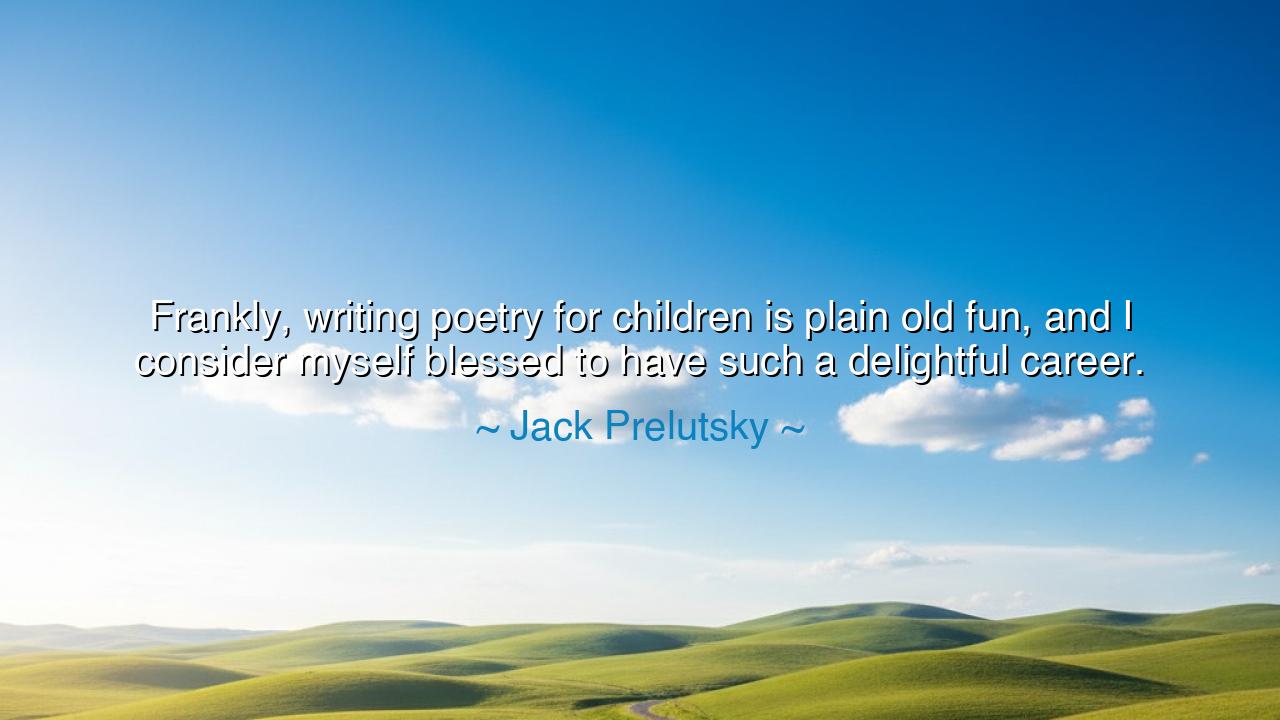
Frankly, writing poetry for children is plain old fun, and I
Frankly, writing poetry for children is plain old fun, and I consider myself blessed to have such a delightful career.






“Frankly, writing poetry for children is plain old fun, and I consider myself blessed to have such a delightful career.” Thus spoke Jack Prelutsky, the first children’s poet laureate of the United States, a man whose words opened doors of laughter and wonder for countless young readers. In his simple yet profound declaration lies the essence of joy in creation—the truth that poetry, when offered to children, is not only an art but also a gift of play, a weaving of delight into the fabric of life.
The meaning of this saying is that poetry need not always be solemn, heavy, or burdened with philosophy. To write for children is to return to the roots of imagination, where language sparkles with nonsense and rhythm dances freely. Prelutsky declares that it is fun—not toil or struggle—that drives his work. And in that fun lies a deeper wisdom: children’s laughter, their delight in rhyme and play, is itself a form of poetry, one that connects us to innocence and to the purest enjoyment of words.
The origin of Prelutsky’s conviction comes from his own life. Before becoming a poet, he wandered through odd jobs and uncertain paths. But once he discovered the joy of writing verses that children could enjoy, his purpose crystallized. He found that the playful rhymes, whimsical creatures, and lively rhythms of his books lit sparks of delight in children who might otherwise never pick up a poem. This career was not a burden but a blessing, a daily practice of turning imagination into laughter and joy.
History offers us other examples of this spirit. Consider Aesop, whose fables, simple in language yet rich in meaning, were told for children but have endured for millennia. Or think of Lewis Carroll, who through the playful madness of Alice’s Adventures in Wonderland gave the world a language of imagination that delights both young and old. Their work, like Prelutsky’s, proves that poetry and storytelling for children is not lesser art, but a foundation upon which whole lives of creativity may be built.
The lesson here is that joy itself can be sacred. Too often we think that only difficulty produces greatness, that only sorrow and struggle can yield art. But Prelutsky reminds us that delight, humor, and laughter are also divine gifts, worthy of cultivation. Writing for children may seem light, but it requires great skill: words must be chosen with precision, rhythms with care, so that they ring naturally in the ear and lodge in memory. To make a child laugh with language is as noble as to make an adult weep.
Practically, this means we must not dismiss what brings us fun and lightness. Seek out work and expression that gives joy, not only to yourself but to others. If you write, play with words. If you create, do not be afraid to delight. And if you guide children, read them poems that tickle their imaginations, for in doing so you give them a treasure that may last their whole lives. For many, the first love of poetry begins not with Shakespeare or Homer, but with the verses that made them laugh as children.
Thus the teaching endures: poetry for children is not a lesser art, but a blessed calling. Jack Prelutsky shows us that when we embrace joy, when we honor play, when we allow fun to guide creation, we bring light into the world. Let us then be unashamed of delight, for in the laughter of children we hear the purest form of poetry—living, rhythmic, and eternal.






LMLe My
Prelutsky’s comment about feeling 'blessed' to write poetry for children really highlights how much passion he has for his craft. I’m curious—does writing for children feel different in terms of its impact? Does he think children’s poetry has the same emotional weight as poetry for adults, or is it more about creating a sense of fun and wonder? What role does humor play in his writing process?
TDThuy Duong
I love how Jack Prelutsky finds so much joy in writing poetry for children. It makes me wonder, though—does writing for a younger audience require a different approach compared to writing for adults? How does one tap into the unique ways children think and feel while still maintaining the artistic integrity of poetry? It seems like a challenging but incredibly rewarding experience!
QG08.8.7 Nguyen Thi Quynh Giao
It’s heartwarming to hear Jack Prelutsky describe writing for children as such an enjoyable experience. Writing for kids seems like it would require a lot of imagination, but also an understanding of their sense of humor and curiosity. How does he balance fun with depth in his poetry? Is there a line between entertainment and teaching that poets like him strive to maintain?
QPNguyen Quoc Phat
Prelutsky’s view on writing poetry for children seems so joyful, and it’s nice to see someone passionate about their work. But I’m curious—what do you think makes poetry for children 'fun'? Does it come from the simplicity of the language or the playful themes? Is it harder to keep poetry engaging for children than for adults, or is the challenge more about making the lessons and emotions accessible in a fun way?
PMPhuong Minh
I love how Jack Prelutsky talks about writing poetry for children as ‘plain old fun.’ It’s refreshing to hear an artist so genuinely enjoy their work. But I wonder—what makes writing for children different from writing for adults? Is it easier to capture a child’s imagination, or does it require a unique type of creativity to speak to younger minds in a meaningful way?